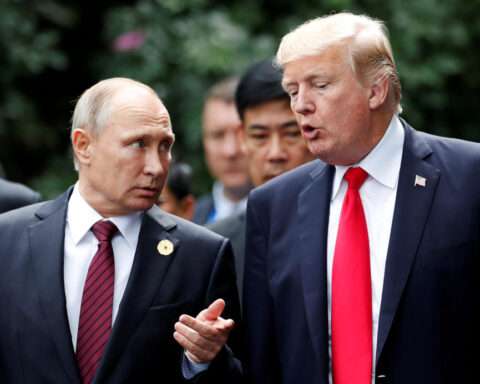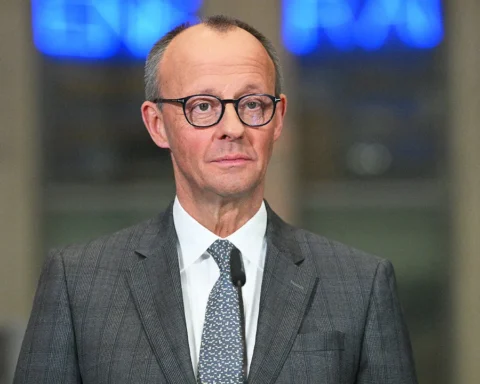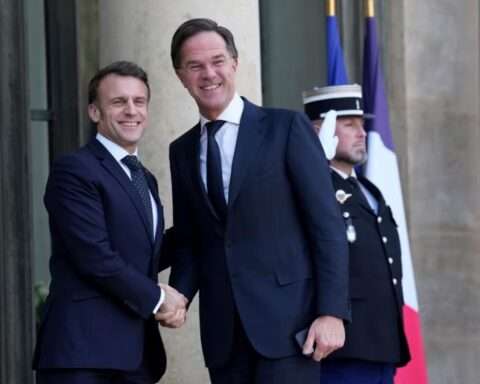The stark warning from the militants on August 23 came after one Afghan guard was killed and three were wounded in a firefight at Kabul airport as the exodus of tens of thousands of people seeking to escape Taliban-run Afghanistan continues.
Two NATO officials at the airport said the situation was under control after the shooting death. The Taliban has deployed fighters outside the airport, where they say they have tried to help enforce some kind of order.
Twenty people have been killed in the chaos at the airport, mostly in shootings and stampedes, as U.S. and international forces try to move citizens and vulnerable Afghans out of the country following the Taliban’s takeover of Afghanistan.
The crisis has prompted U.S. President Joe Biden to note that his national security team was discussing the possibility of extending an August 31 deadline.
U.K. Prime Minister Boris Johnson is expected to press Biden at an emergency meeting of Group of Seven leaders on August 24 to extend the Kabul evacuations, while France’s foreign minister said Paris agreed that more time was needed to complete the process.
But Taliban spokesman Suhail Shaheen told Sky News in an interview broadcast on August 23 that such a move would create “mistrust” and “provoke a reaction.”
“It’s a red line. President Biden announced that on 31 August they would withdraw all their military forces. So if they extend it that means they are extending occupation while there is no need for that,” Shaheen said.
“If the U.S. or U.K. were to seek additional time to continue evacuations — the answer is no. Or there would be consequences,” he added. He did not elaborate on what the consequences may be.
A White House official said the United States “has evacuated and facilitated the evacuation of approximately 37,000 people” since August 14.
A total of about 16,300 people have been ferried in 89 U.S. and coalition flights over the previous day, the official said.
The firefight at the north gate of Kabul airport, in which three more Afghans were wounded, was reported by Germany’s armed forces.
The exchange of fire broke out between unidentified gunmen, U.S. and German forces, and Afghan guards, a Twitter statement said without specifying whether the dead Afghan was one of the Taliban fighters deployed to guard the airport.
The United States has voiced concerns about a possible threat from Islamic State militants in Afghanistan known as ISIS-K, a foe of the Taliban, around the airport. White House national-security adviser Jake Sullivan called the threat “real and acute” in remarks to CNN.
The U.S. military has been in constant contact with the Taliban to facilitate the evacuations. Biden has said the group has been “cooperative in extending some of the perimeter” around the airport as thousands gather in the area.
WATCH: There were chaotic scenes at the evacuation center outside Kabul airport on August 21 as footage from British broadcaster Sky News showed soldiers covering the bodies of people crushed trying to flee the country.
Thousands of U.S., British, and allied troops have secured Kabul’s airport, and struggled to keep crowds at bay and away from tarmacs as military and civilian aircraft take off carrying foreigners and Afghans.
Growing security threats have prompted U.S. military planes to do rapid, diving, combat landings at the Kabul airport and other aircraft have been seen shooting flares on takeoff, apparently in an attempt to confuse possible heat-seeking missiles.
The U.S. Embassy issued a new security alert warning citizens not to travel to the Kabul airport without individual instruction from a U.S. government representative. Some U.S. citizens are being flown by helicopter from destinations within Kabul directly to the airport.
The Pentagon, meanwhile, ordered six commercial airlines to help transport people after their evacuation. In total, 18 commercial aircraft from major carriers like United, American, and Delta will be used to ferry people from temporary locations after arriving from Afghanistan. The planes will not travel to Kabul itself.
Taliban leaders have reportedly begun talks on forming a government as Kabul residents complained that the public and telecom services are still being disrupted and banks remained closed more than a week after the militants seized the capital.
“We have no money. Banks are closed. There is no money. There are no credit cards,” a resident who didn’t give her name, told RFE/RL’s Radio Azadi over the phone.
“Mobile phones do not work properly. The Internet does not work. Poor teachers have not received their salaries. All government employees are unpaid. It is not known when the banks will open. Everyone is worried,” she said.
With the Taliban trying to consolidate its control over Kabul and establish law and order, the group faced a new challenge in a northern district from fighters who refuse to recognize the militant groups’s claim to power.
Remnants of government troops and special forces have reportedly gathered in the Panjshir Valley, north of the capital — long known as an anti-Taliban stronghold — and joined local militiamen in forming a National Resistance Front.
The Taliban said its fighters had retaken three districts in northern Baghlan Province that neighbor Panjshir Province — Banu, Pol-e Hesar, and Deh Salah.
But local sources told Radio Azadi on August 23 that clashes were going on in two of those districts between popular uprising forces and the Taliban.
Local forces recently claimed that three districts were “freed from Taliban control.”
The Islamists have “massed forces near the entrance of Panjshir,” tweeted Amrullah Saleh, a vice president in the previous government who has taken refuge in the area.
One of the front’s leaders is Ahmad Masud, the son of famed anti-Soviet and anti-Taliban commander Ahmad Shah Masud.
Ahmad Masud said on August 22 that he hoped to hold peaceful talks with the Islamist movement but that his forces in Panjshir were ready to fight.
“We want to make the Taliban realize that the only way forward is through negotiation,” he said. “We do not want a war to break out.”
However, the front is prepared for a “long-term conflict,” spokesman Ali Maisam Nazary said.
Meanwhile, the Kremlin said President Vladimir Putin expressed “deep concern” during an online emergency session of the Russian-led Collective Security Treaty Organization (CSTO) over “the potential threats coming from Afghanistan.”
At the talks, Putin and Central Asian leaders voiced concerns that the Islamic State extremist group still had a foothold in Afghanistan and was a threat, Putin’s spokesman Dmitry Peskov said.
The Collective Security Treaty Organization includes Russia, Belarus, Kazakhstan, Armenia, Kyrgyzstan, and Tajikistan.






